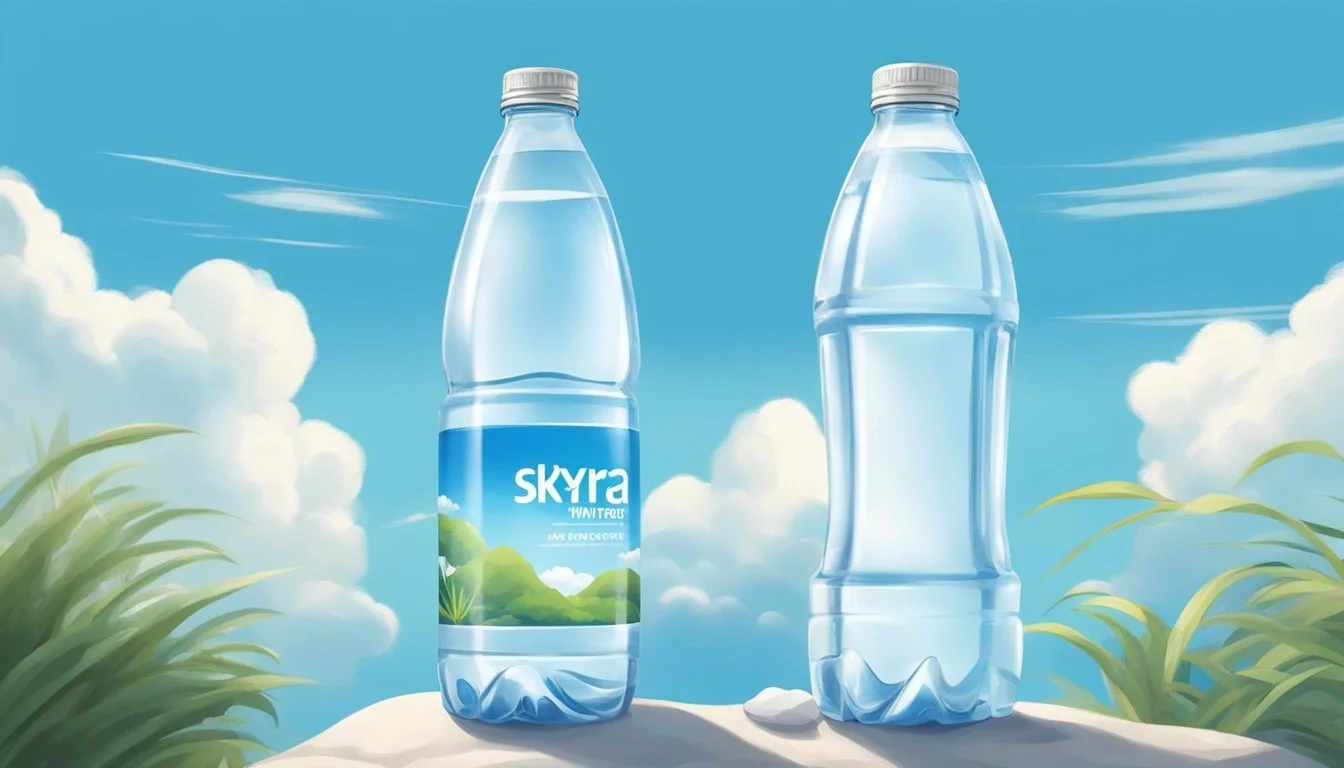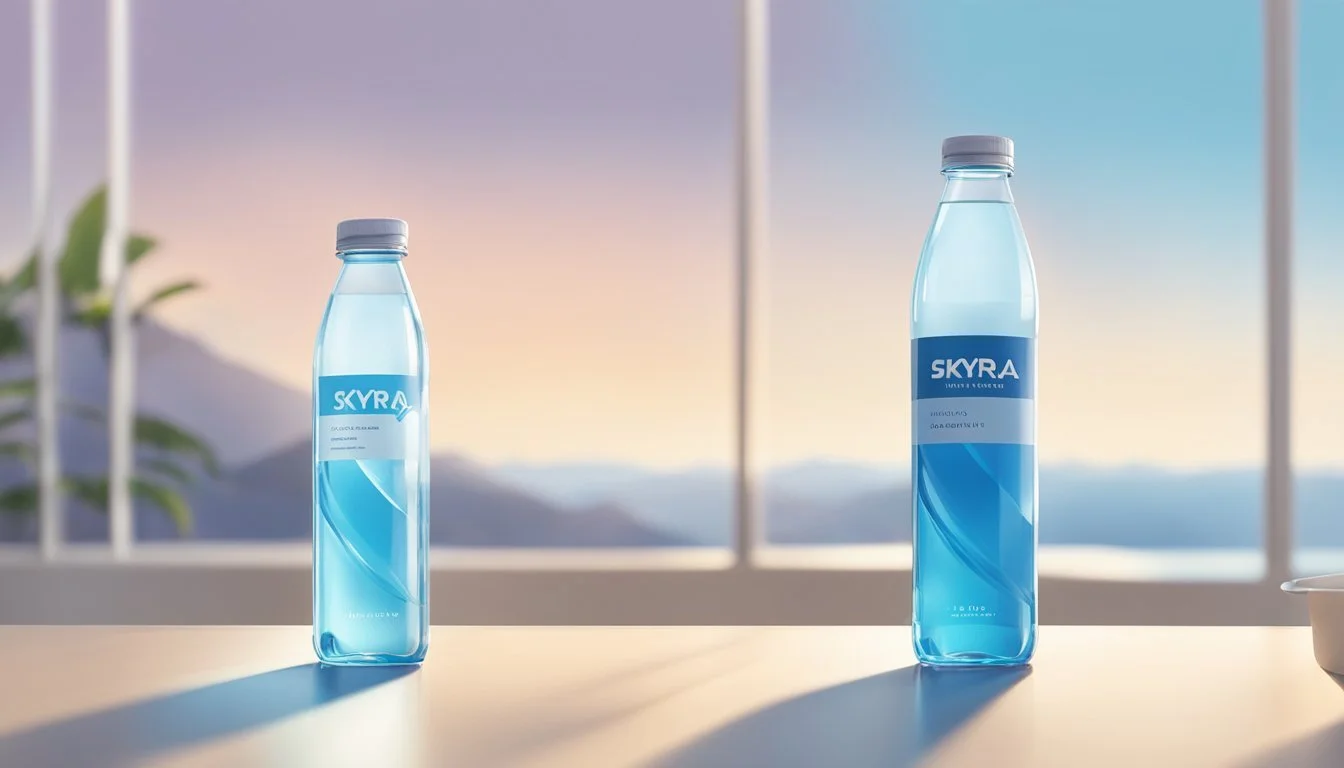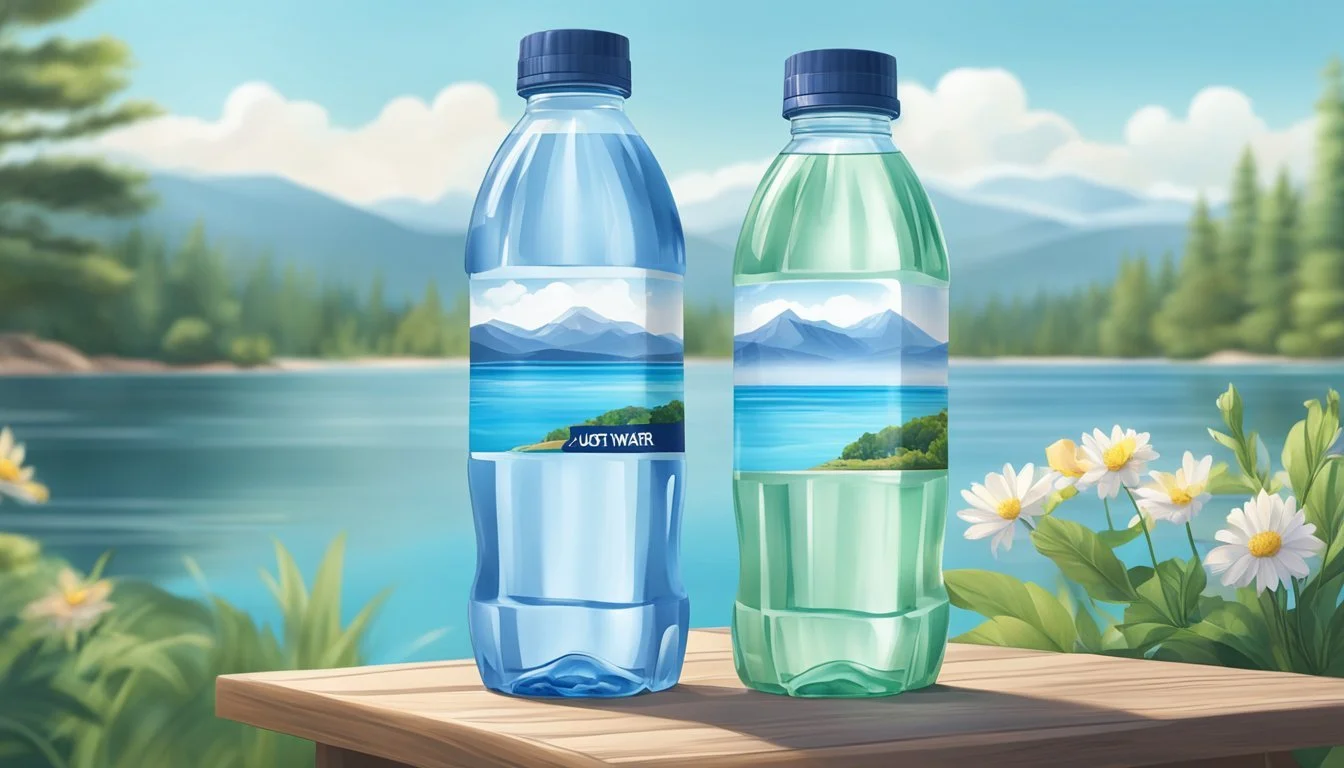Just Water vs. Skyra
Which Bottled Water is Better? A Comparative Review
Choosing between Just Water and Skyra can be challenging for those looking to refine their bottled water preferences. For consumers seeking a sustainably sourced option, Just Water stands out with its focus on renewable resources and eco-friendly packaging. Meanwhile, Skyra offers a unique appeal through its high-quality Icelandic spring water, known for its clean and crisp taste.
Just Water, packaged in plant-based bottles, provides a more environmentally friendly option. The water is sourced from natural springs and is rich in essential minerals, promising a refreshing experience.
Skyra, on the other hand, comes from a pristine source in Iceland, delivering a pure and smooth drinking experience. Its commitment to quality and minimalistic packaging adds to its allure for those who prioritize taste above all.
Understanding Bottled Water
The production, distribution, and regulation of bottled water involve various intricate components. These range from its historical origins to the contemporary market landscape, the diverse types available, and the stringent safety standards in place to ensure consumer safety.
History of Bottled Water
Bottled water has a long and varied history. It began in the 17th century with selling mineral water from natural springs for medicinal purposes.
Companies like Schweppes, founded in the late 1700s, helped popularize bottled water. The industry saw significant growth in the 20th century, particularly with the introduction of plastic bottles.
This evolution transformed bottled water from a niche product to a common commodity globally. Brands such as Evian and Perrier have been pioneers in promoting bottled water as not just a health product but also a lifestyle choice.
Bottled Water Market Overview
The bottled water market is diverse and competitive, with numerous major players. Brands like Fiji, Dasani, Aquafina, and Smartwater dominate the scene, each offering unique selling points.
Fiji promotes its water's "untouched" nature sourced from an aquifer in the Yaqara Valley. Dasani and Aquafina cater to the purified water segment, ensuring high levels of purity through extensive filtration processes.
Premium brands like Voss and Icelandic Glacial emphasize the pristine nature of their sources. The market includes various price segments, from budget-friendly options like Nestlé Pure Life to luxury brands like Acqua Panna.
Types of Bottled Water
Bottled water can be categorized into several types. Natural spring water comes from underground springs and requires minimal processing. Mineral water contains specific minerals and must come from a protected spring source.
Purified water undergoes extensive filtration to remove contaminants, resulting in high purity levels. Sparkling water is infused with carbon dioxide for effervescence.
Brands like Poland Spring offer natural spring water, while others like Lifewtr focus on purified water. Sparkling options are available from brands such as Perrier.
Water Source and Filtration Processes
The source and filtration processes of bottled water significantly affect its quality. Mountain spring water and groundwater are common sources. Some brands use artesian wells or protected catchments.
Purification techniques include methods like reverse osmosis, distillation, and UV light treatment. Aquafina and Dasani implement rigorous purification processes to remove impurities.
Brands like Icelandic Glacial use natural filtration as the water passes through volcanic rock, ensuring natural cleanliness. Core Hydration advertises water balanced to a specific pH level, catering to health-conscious consumers.
Regulations and Safety Standards
Bottled water is subject to strict regulatory oversight. In the United States, the Food and Drug Administration (FDA) governs bottled water, whereas tap water is regulated by the Environmental Protection Agency (EPA).
Regulations encompass labeling, quality standards, and safety protocols. Water must meet specific contaminant limits for substances like fluoride and BPA.
Countries establish standards to ensure bottled water is free from harmful contaminants. Premium brands undergo additional voluntary testing to assure consumers of their product's safety and quality.
Analyzing Just Water and Skyra
When comparing Just Water and Skyra, several facets provide insight into each brand's strengths and specialties. These include the origins, packaging innovations, environmental impact, water quality and taste, and price and accessibility.
Brand Origins and Philosophy
Just Water emerged with a focus on sustainability and environmental responsibility. Founded by a group that includes Jaden Smith, the brand aims to offer pure spring water collected from sustainable, well-managed sources. The company promotes a vision of reducing plastic waste through innovative packaging.
Skyra, on the other hand, emphasizes its Icelandic heritage. The water is sourced from natural springs in Iceland and filtered through ancient lava fields, offering a narrative of purity and natural filtration. Skyra positions itself as a provider of high-quality, naturally alkaline water with a pH of 8.88.
Packaging Innovations
Just Water sets itself apart with its unique packaging. The water comes in paper-based cartons, which are 82% plant-derived. This carton is primarily made from paper sourced from forests certified by the Forest Stewardship Council. The cap is made from sugarcane-based plastic, adding to its ecological credentials.
Skyra opts for more traditional packaging, bottling its water in recyclable plastic and glass. While they focus on minimizing their carbon footprint, they do not deviate from conventional materials. Skyra's use of glass bottles is marketed towards a premium audience, suggesting a focus on luxury and environmental consciousness.
Environmental Impact
Just Water has a strong emphasis on sustainability. The company claims a significantly reduced carbon footprint due to its lightweight cartons, which result in lower transportation emissions. By using plant-based materials, Just Water also helps reduce reliance on fossil fuels.
Skyra emphasizes its naturally replenishing source, which ensures that water extraction does not deplete local resources. Their packaging is fully recyclable, and they seek to minimize their environmental impact through responsible sourcing and bottling practices. However, the reliance on plastic bottles contributes to broader waste and recycling challenges.
Water Quality and Taste
Just Water sources its water from the Adirondack Mountains. The water undergoes minimal processing, maintaining its natural taste and mineral content. Consumers of Just Water often note a neutral, clean taste, which appeals to those seeking pure hydration.
Skyra offers a distinctive drinking experience due to its high pH of 8.88 and filtration through volcanic rock. The water is described as velvety with a slight minerality, providing a unique taste profile. This quality appealing to individuals who prefer a hint of natural minerals in their water.
Price and Accessibility
Just Water is priced competitively, making it accessible to a wide audience, including eco-conscious consumers. The cartons can be found in various grocery stores and online retailers, ensuring broad distribution.
Skyra is positioned as a premium product, reflected in its pricing. At $2.69 per bottle, it is marketed towards consumers willing to pay more for high-quality water. Skyra can be found at specialty shops and major convenience stores, including 7 Eleven.
This balanced approach highlights both brands' unique aspects, catering to different consumer preferences regarding sustainability, taste, and accessibility.
Health and Wellness Considerations
When choosing between Just Water and Skyra, it is essential to evaluate their impact on health and wellness. Understanding hydration benefits and the mineral content can guide consumers in making an informed decision.
Hydration and Health Benefits
Hydration is paramount for maintaining bodily functions such as temperature regulation and joint lubrication. Both Just Water and Skyra provide convenient hydration solutions, but there are differences in their packaging and added minerals.
Just Water focuses on environmental health by using plant-based packaging, which may appeal to eco-conscious consumers. Skyra, on the other hand, markets itself as naturally alkaline water, claiming benefits such as improved metabolism and detoxification.
Both brands lack fluoride. While fluoride is beneficial for dental health by preventing cavities, some consumers may prefer water without it due to personal health beliefs.
Comparing Mineral Content
Mineral content is a significant factor in bottled water choice. Just Water emphasizes purity with minimal processing and natural spring origins. It contains essential minerals but lacks significant quantities, making it suitable for those preferring a light mineral profile.
Skyra stands out for its higher mineral content, particularly its naturally occurring alkalinity which can influence taste and potential health effects. Alkaline water proponents seek benefits like reduced acid reflux and improved hydration levels.
Consumers should compare the specific mineral listings on each brand's labels. These details can help determine which water best meets their health needs, ensuring that each sip contributes to their overall wellness.
Consumer Experience
Examining the taste profiles and lifestyle convenience of Just Water and Skyra will offer a good understanding of their appeal to consumers.
Taste Profile Comparisons
Just Water boasts a crisp, clean taste with a slight hint of added minerals, making it refreshing to drink. The water is sourced from a naturally alkaline spring, which contributes to its balanced pH level. Skyra offers a similar purity with a unique taste profile stemming from its Icelandic glacial origins. Consumers often note the smooth, almost silky mouthfeel of Skyra, attributing this to its volcanic filtration process.
Lifewtr and Smartwater are comparable options but lean more towards a processed taste due to added electrolytes. A water sommelier might recommend tasting both Just Water and Skyra at varying temperatures to appreciate the subtle flavor nuances.
Convenience and Lifestyle
Convenience plays a significant role in consumer preferences for bottled water. Just Water's eco-friendly packaging made from 82% renewable resources appeals to environmentally conscious buyers. The brand’s reusable bottle concept also aligns with sustainable lifestyle choices.
Skyra, available in many grocery stores, emphasizes convenience through its widely distributed recyclable plastic bottles. It attracts those seeking a premium hydration experience without the guilt of excessive environmental impact.
Products like Lifewtr and Smartwater are popular in urban settings, often found in gyms and cafes, catering to a fast-paced lifestyle. Both Just Water and Skyra's sustainable focus and ease of accessibility make them favorable choices for consumers prioritizing both health and convenience.
Eco-Friendly Practices and Sustainability
Both Just Water and Skyra emphasize their commitment to sustainability through various eco-friendly practices. These initiatives encompass sustainable packaging solutions and responsible water resource management.
Sustainable Packaging Initiatives
Just Water's packaging includes 82% renewable resources, mainly paper from sustainably managed forests and a plant-based cap. Their cartons are 100% recyclable and support a closed-loop recycling system, aiming to minimize waste and maximize resource reuse.
On the other hand, Skyra uses bottles made from high-quality, recyclable materials. They focus on reducing plastic waste by navigating away from single-use plastic bottles and pushing for more sustainable alternatives. This approach seeks to lower environmental impact without compromising the quality of their packaging.
Both brands strive to balance packaging efficiency with sustainability goals, ensuring their products are environmentally friendly and practical for everyday use.
Water Resource Management
Just Water sources their water responsibly, often from regions where water replenishment rates are high, ensuring the long-term sustainability of their sources. They invest in technologies to track and manage their water usage, aligning their practices with broader environmental goals.
Skyra also emphasizes the sustainability of its water sources, focusing on minimizing the ecological footprint of extraction processes. They adopt measures like water recycling and reduced wastage at their bottling facilities.
Efforts taken by both brands demonstrate their dedication to sustainable water resource management, aiming to lessen the ecological impact while providing high-quality bottled water.
Final Thoughts on Just Water and Skyra
Just Water stands out for its innovative packaging and commitment to sustainability. The water itself is pure and refreshing, offering a still and a carbonated "Bubbles" version. The bottles, made from recyclable materials, appeal to environmentally conscious consumers.
Skyra comes from a pristine Icelandic source, naturally filtered through basalt and lava. This water has a high pH of 8.88, providing a slightly alkaline taste that some consumers might prefer. The packaging is traditional, highlighting the water's purity and natural origins.
Feature Just Water Skyra Source Various U.S. springs Icelandic spring, filtered through basalt and lava pH Level Neutral High, 8.88 Packaging Recyclable aluminum or paper-based Traditional plastic Price (each) $2.50 for 16 fl oz $2.69 for 16 fl oz
Consumers may decide based on personal preference for taste, packaging, and source. Just Water emphasizes sustainability and environmental impact. Skyra offers unique geological filtering and a naturally high pH.
For those who prioritize eco-friendly packaging, Just Water might be more appealing. Those focused on the natural filtration process and mineral content may lean towards Skyra.
While both options provide high-quality bottled water, the final choice revolves around individual preferences related to taste, packaging, and the brand's environmental stance. Both have their unique strengths, catering to different consumer decisions.
More About Just Water
Core Hydration vs Just Water: Which Bottled Water is Better?
Icelandic Glacial vs Just Water: Which Bottled Water is Better?
Just Water vs Aqua Carpatica: Which Bottled Water is Better?
Just Water vs Cascade Mountain: Which Bottled Water is Better?
Just Water vs Crystal Geyser: Which Bottled Water is Better?
Just Water vs Hawaii Volcanic: Which Bottled Water is Better?
Just Water vs Hawaiian Springs: Which Bottled Water is Better?
Just Water vs Kirkland Signature: Which Bottled Water is Better?
Just Water vs Mountain Valley Spring Water: Which Bottled Water is Better?
Just Water vs Nestle Pure Life: Which Bottled Water is Better?
Just Water vs Richard's Rainwater: Which Bottled Water is Better?
Just Water vs San Pellegrino: Which Bottled Water is Better?
Just Water vs Solan de Cabras: Which Bottled Water is Better?
Just Water vs Talking Rain AQA: Which Bottled Water is Better?
Just Water vs Whole Foods 365: Which Bottled Water is Better?
Just Water vs Whole Foods Italian Still Mineral water: Which Bottled Water is Better?






